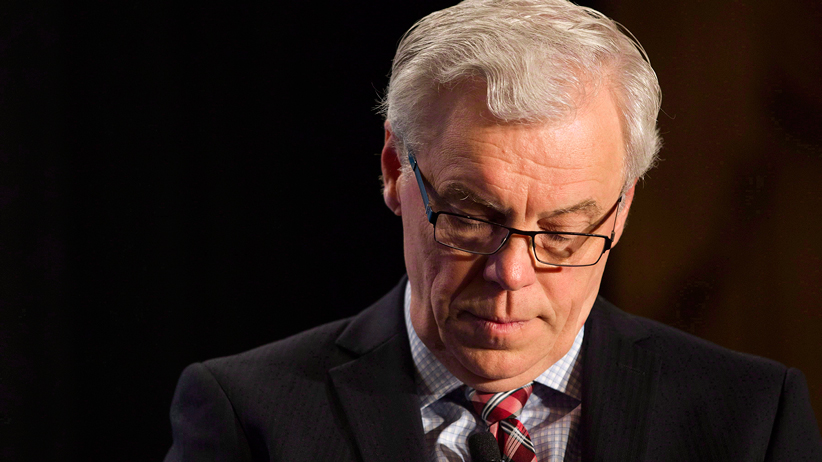What Manitoba’s caucus mutiny means for democracy in Canada
The editorial: The mutiny by Manitoba’s caucus could be a major step toward restoring parliamentary responsibility
Manitoba Premier Greg Selinger responds to media questions regarding the throne speech at the Manitoba Legislature in Winnipeg, Tuesday, Nov. 12, 2013. THE CANADIAN PRESS/John Woods
Share

If you happen to be the premier of Manitoba, these are grim times. For the rest of us, however, the conflict between Greg Selinger and his restive NDP caucus is a good thing: It suggests important changes are afoot in how parliamentary democracy operates in Canada.
Selinger’s leadership has been under siege, and his party’s popularity in free fall since last year, when he increased the provincial sales tax by one percentage point—after having specifically promised not to, back in 2011. Two weeks ago, five high-profile cabinet ministers, including those of finance, health and justice, resigned after unsuccessfully trying to convince Selinger to step aside in hopes of reviving the government’s fortunes.
After shuffling his cabinet and vowing to ride out the storm, this past weekend, Selinger changed tack and said he’ll hold a leadership convention in March. With the party executive still working out the details, Selinger says he intends to run against all comers while still holding down his job as premier.
That a sitting premier has been forced into such a situation by his own cabinet is certainly unusual. But this is not, as the Winnipeg Free Press claims, an “unprecedented mutiny.” There was a time when caucus revolts against sitting premiers and prime ministers was a common occurrence. Prime minister Sir John A. Macdonald was forced to resign during the 1873 Pacific Scandal when his own party refused to back him in the wake of revelations that he received payoffs from a railroad baron. A few years later, Mackenzie Bowell, Canada’s fifth prime minister, was also forced out of office following the resignation of several cabinet ministers—or, as Bowell called them, a “nest of traitors.” And, in 1905, Liberal premier Simon-Napoléon Parent won a landslide victory in the Quebec provincial election; just a few months later, three cabinet ministers resigned and another 44 caucus members demanded he step down. He did. The Liberals remained in power for another 31 years.
Throughout Canada’s early history, elected representatives were essentially free agents with the power to choose party leaders, and to remove them whenever they lost confidence in their ability to lead. This created a crucial debt of responsibility owed by leaders to their caucuses and, by extension, to the voters who elected the MPs. After the First World War, however, mass membership leadership conventions became the rule. Ever since, leaders have argued they’re accountable to their parties, and not the elected members of their caucus. Canadian politics is poorer for the change.
With individual MPs or MLAs unable to exert real influence over leadership decisions, premiers and prime ministers have turned the situation to their own advantage. Power has become increasingly centralized in leaders’ offices. Elected members are routinely bullied or ignored. Recall former Conservative MP Brent Rathgeber, who had no choice but to resign from caucus last year after the Prime Minister’s Office demanded changes to his private member’s bill on public salary disclosure. This one-way power dynamic is a perversion of the foundation of Canadian democracy: that voters are represented in Parliament by their elected MPs, not the leader or their party. Turning MPs into trained seals is an insult to every Canadian.
The current Manitoba imbroglio should thus be seen as a major step towards restoring parliamentary responsibility. Selinger is putting his position to a vote because his caucus forced him to; the leader is no longer immune to the views of the voters’ representatives. (It could be argued, however, that rather than holding a leadership convention six months hence, Selinger should immediately call a general election. As Canadian historian Christopher Moore points out in an interview, “An executive which lacks the confidence of a majority of the people’s elected representatives is no longer a legitimate government.”)
There are other encouraging signs the balance of power is finally swinging back in favour of elected representatives. Consider the all-party support given federal Conservative backbencher Michael Chong’s private member’s bill strengthening the security and power of individual MPs. In addition to new rules governing riding nominations, Chong’s plan, which passed second reading in September, would also allow MPs to remove a sitting leader via secret ballot. A party leadership convention would then follow. In this way, both caucus and party members have a say in leadership decisions, a procedure similar to that used by the British Conservative party.
The unfettered accretion of power in the hands of premiers and prime ministers is an unhealthy development for Canadian democracy. Leaders need to be reminded that they answer to voters through their elected representatives, and not the other way around. If it takes the occasional caucus mutiny to keep this top of mind, so be it.